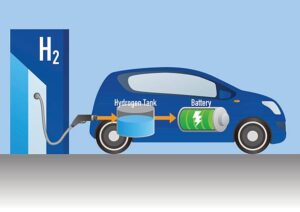
As the world shifts towards more sustainable energy sources, the automotive industry is undergoing a significant transformation. Electric vehicles (EVs) have led the charge, but another formidable contender is emerging: hydrogen-powered vehicles. Airober, a trailblazer in innovative energy solutions, is at the forefront of this revolution with their Hydrogen Kit for cars. This kit promises to bring the advantages of hydrogen fuel cells to the mainstream, offering an exciting alternative to traditional internal combustion engines and even battery-powered EVs.
What is Airober’s Hydrogen Kit for Cars?
Airober’s Hydrogen Kit is an advanced retrofit system designed to convert conventional gasoline or diesel-powered vehicles into hydrogen fuel cell-powered cars. This kit includes everything needed to make the switch: hydrogen storage tanks, fuel cells, an energy management system, and all necessary components to ensure a smooth integration with the vehicle’s existing drivetrain.
How the Hydrogen Kit Works
The core of the Hydrogen Kit is the fuel cell stack, which generates electricity by combining hydrogen gas with oxygen from the air. Here’s a step-by-step look at how the system works:
- Hydrogen Storage: The kit includes high-pressure tanks designed to safely store hydrogen gas. These tanks are engineered to withstand extreme conditions, ensuring the safety and reliability of the system.
- Fuel Cell Stack: Hydrogen from the storage tanks is fed into the fuel cell stack, where it undergoes an electrochemical reaction with oxygen. This reaction produces electricity, water, and heat. The electricity generated is then used to power the vehicle’s electric motor, replacing the need for a traditional internal combustion engine.
- Energy Management System (EMS): Airober’s EMS optimizes the power output from the fuel cell stack, ensuring that the vehicle receives a steady and reliable supply of electricity. The EMS also monitors the overall system, adjusting the power flow based on driving conditions and demand.
- Water Emission: Unlike gasoline or diesel engines that emit harmful gases, the only byproduct of a hydrogen fuel cell is water, which is expelled as vapor through the exhaust system. This makes hydrogen-powered cars a zero-emission alternative to traditional vehicles.
Why Hydrogen? The Benefits Over Conventional and Electric Vehicles
Hydrogen fuel cell technology offers several key advantages over both internal combustion engines and battery-electric vehicles (BEVs):
1. Zero Emissions
Hydrogen fuel cells produce no harmful emissions, with water being the only byproduct. This positions hydrogen-powered vehicles as a leading solution for reducing greenhouse gases and combating climate change.
2. Quick Refueling
One of the main advantages of hydrogen over electric batteries is refueling time. While BEVs require hours to recharge, hydrogen tanks can be refilled in just a few minutes, similar to refueling a gasoline vehicle. This makes hydrogen cars much more convenient for long-distance travel and daily commuting.
3. Longer Range
Hydrogen fuel cells offer a greater energy density than batteries, allowing for longer driving ranges on a single tank of hydrogen. This makes hydrogen-powered vehicles more practical for drivers who need to travel long distances without frequent stops.
4. Sustainability
Hydrogen is the most abundant element in the universe and can be produced from various sources, including water and renewable energy. As the infrastructure for green hydrogen production expands, the environmental footprint of hydrogen vehicles will continue to shrink.
5. Reduced Dependence on Lithium
While BEVs rely heavily on lithium-ion batteries, which have environmental and supply chain concerns, hydrogen fuel cells do not require lithium. This reduces the demand for mining and processing lithium, making hydrogen a more sustainable and ethical alternative.

Airober’s Vision for the Hydrogen Economy
Airober’s Hydrogen Kit is more than just a product; it’s a step towards building a broader hydrogen economy. By making it easier to convert existing vehicles to run on hydrogen, Airober is helping to accelerate the adoption of hydrogen as a mainstream fuel source. This shift is crucial for reducing global dependence on fossil fuels and achieving net-zero emissions targets.
The Road Ahead: Challenges and Opportunities
While hydrogen fuel cell technology offers many advantages, there are challenges to overcome. The current infrastructure for hydrogen refueling stations is still limited, particularly in regions where EV charging networks are already well-established. However, as interest in hydrogen grows, investments in infrastructure are expected to increase, making hydrogen refueling more accessible.
Additionally, the cost of producing green hydrogen (hydrogen generated using renewable energy) needs to be reduced to make hydrogen-powered vehicles more competitive with traditional and electric vehicles. Airober is actively engaged in research and development to address these challenges, working towards more affordable and efficient hydrogen solutions.
Conclusion: A Sustainable Future on the Horizon
Airober’s Hydrogen Kit represents a significant advancement in the journey towards sustainable transportation. By offering a viable alternative to gasoline and electric vehicles, Airober is helping to pave the way for a cleaner, greener future. As hydrogen infrastructure continues to develop and the cost of hydrogen production decreases, the dream of a hydrogen-powered world is becoming increasingly attainable.
The future of transportation is here, and it’s powered by hydrogen. Explore Airober’s Hydrogen Kit today and join the movement towards a zero-emission future.

Leave a Reply